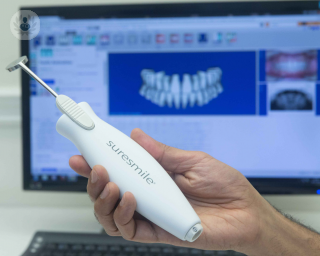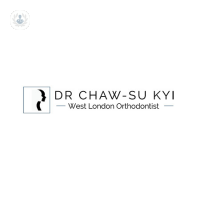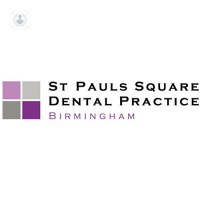What are lingual braces?
There are many different types of braces to choose from when it comes to teeth straightening, and lingual braces are a great option for people who are conscious about the way their braces look. Lingual braces are sometimes nicknamed ‘hidden braces’ as they are fitted to the inside of your teeth instead of the front surface like traditional braces. They are almost invisible and for that reason are most commonly fitted in adults rather than children.

How do lingual braces work?
Lingual braces work the same way as conventional braces in the way that they apply a continuous pressure which gradually straightens teeth, fixes gaps, overcrowding and problems with bite. However, they are bonded to the back of the teeth instead of the front as with traditional braces. Lingual braces are comprised of archwires and metal brackets, which are custom-made to fit the individual shape of the problem teeth.
Will lingual braces give me a lisp?
The tongue touches the backs of your teeth to make certain sounds when you talk. As lingual braces are fitted on the insides of the teeth, the speech will be affected at first. Eventually, the tongue adjusts to the new sensation of a lingual brace and the speech returns to normal within a week or two. If the lingual brace interferes with speech longer than this, it is recommended to have an appointment with a voice tutor therapist.
What can I expect when wearing lingual braces?
During the initial period of the braces being attached to the back of the teeth, there may be some pain and discomfort for a little longer than with other fitted braces. Good oral hygiene is important, especially when wearing lingual braces because food particles may become trapped in pockets at the back of teeth. Teeth should be brushed following every meal.
What are the advantages of lingual braces?
The advantages of lingual braces over traditional braces include:
- They are nearly invisible
- They correct most bite problems
- They can be customised
What are the disadvantages of lingual braces?
The disadvantages of having lingual braces fitted include:
- Lingual braces are more expensive than traditional braces
- They cause a temporary lisp at the beginning
- They may take longer than traditional braces
What are lingual braces?
Dr Brian Dunne - Orthodontics
Created on: 11-22-2013
Updated on: 09-25-2023
Edited by: Conor Dunworth
What are lingual braces?
There are many different types of braces to choose from when it comes to teeth straightening, and lingual braces are a great option for people who are conscious about the way their braces look. Lingual braces are sometimes nicknamed ‘hidden braces’ as they are fitted to the inside of your teeth instead of the front surface like traditional braces. They are almost invisible and for that reason are most commonly fitted in adults rather than children.

How do lingual braces work?
Lingual braces work the same way as conventional braces in the way that they apply a continuous pressure which gradually straightens teeth, fixes gaps, overcrowding and problems with bite. However, they are bonded to the back of the teeth instead of the front as with traditional braces. Lingual braces are comprised of archwires and metal brackets, which are custom-made to fit the individual shape of the problem teeth.
Will lingual braces give me a lisp?
The tongue touches the backs of your teeth to make certain sounds when you talk. As lingual braces are fitted on the insides of the teeth, the speech will be affected at first. Eventually, the tongue adjusts to the new sensation of a lingual brace and the speech returns to normal within a week or two. If the lingual brace interferes with speech longer than this, it is recommended to have an appointment with a voice tutor therapist.
What can I expect when wearing lingual braces?
During the initial period of the braces being attached to the back of the teeth, there may be some pain and discomfort for a little longer than with other fitted braces. Good oral hygiene is important, especially when wearing lingual braces because food particles may become trapped in pockets at the back of teeth. Teeth should be brushed following every meal.
What are the advantages of lingual braces?
The advantages of lingual braces over traditional braces include:
- They are nearly invisible
- They correct most bite problems
- They can be customised
What are the disadvantages of lingual braces?
The disadvantages of having lingual braces fitted include:
- Lingual braces are more expensive than traditional braces
- They cause a temporary lisp at the beginning
- They may take longer than traditional braces


Wedded to the digital wow factor
By Dr Asif Chatoo
2024-11-21
The future is here, and it’s digital. Why are 3D scanners making such an impression in the orthodontics world? We spoke to Dr Asif Chatoo, leading specialist in orthodontics and founder of The London Lingual Orthodontic Clinic. See more


The benefits of intraoral scanners in orthodontics
By Dr Laurence Masters
2024-11-19
New technology is undoubtedly changing how the medical world works, assisting diagnoses and making it easier to predict the right course of treatment for patients. New technology also has a major role to play in orthodontics. We decided to ask Dr Laurence Masters about how the 3Shape TRIOS® scanner has helped him at his clinic. See more


Incognito lingual braces: how long will I need them?
By Dr Usman M Qureshi
2024-11-19
Been told that you need to have braces and considering Incognito lingual braces? We've asked one of our leading orthodontists Dr Usman M. Qureshi just how long the braces will need to be fitted for and if they affect your speech. See more


Will lingual braces affect my speech?
By Dr Asif Chatoo
2024-11-18
The tongue is an amazing organ. It is essential in providing the sense of taste, allowing us to eat, drink, and swallow, and enabling us to speak. Highly flexible, sensitive, and adaptable, the tongue performs the most complex and specialised motor activity that the human body can do. Because lingual braces take up space on the back of the teeth, there is potential for them to have an impact on the normal movement of the tongue. Leading orthodontist Dr Asif Chatoo explains: See more
Experts in Lingual braces
-
Dr Pharooq Mirza
DentistryExpert in:
- Orthodontics
- Paediatric orthodontics
- Invisalign
- Lingual braces
- Invisible braces
- Aesthetic orthodontics
-
Dr Chaw-Su Kyi
OrthodonticsExpert in:
- Invisalign
- Lingual braces
- Damon braces
- Orthodontics
- Teeth whitening
- Paediatric orthodontics
-
Dr Dipen Patel
DentistryExpert in:
- Orthodontics
- Lingual braces
- Invisalign
- Prosthetic ceramic / zirconium
- Braces
- Teeth whitening
-
Dr Amritraj Singh Jabbal
OrthodonticsExpert in:
- Orthodontics
- Interceptive orthodontics
- Lingual braces
- Invisible braces
- Accelerated orthodontics
- Aesthetic orthodontics
-
Dr Brian Dunne
OrthodonticsExpert in:
- Orthodontics
- Invisalign
- Braces
- Lingual braces
- Damon braces
- Invisible braces
- See all

West London Orthodontist Cosmetic Dental Studios
West London Orthodontist Cosmetic Dental Studios
89 Hammersmith Grove, London
No existe teléfono en el centro.
By using the telephone number provided by TOP DOCTORS, you automatically agree to let us use your phone number for statistical and commercial purposes. For further information, read our Privacy Policy
Top Doctors

St Paul's Square Dental Practice
St Paul's Square Dental Practice
Studio 1, 51 St Paul's Square, Birmingham B3 1QS
No existe teléfono en el centro.
By using the telephone number provided by TOP DOCTORS, you automatically agree to let us use your phone number for statistical and commercial purposes. For further information, read our Privacy Policy
Top Doctors

Harley Street Dental Studio
Harley Street Dental Studio
52 Harley Street, Marylebone. W1G 9PY
No existe teléfono en el centro.
By using the telephone number provided by TOP DOCTORS, you automatically agree to let us use your phone number for statistical and commercial purposes. For further information, read our Privacy Policy
Top Doctors
-
West London Orthodontist Cosmetic Dental Studios
89 Hammersmith Grove, London, West LondonExpert in:
- Orthodontics
- Invisible braces
- Orthodontics (children)
-
St Paul's Square Dental Practice
Studio 1, 51 St Paul's Square, Birmingham B3 1QS, BirminghamExpert in:
- Crowns
- Endodontics
- Dental implants
- Dental check up (adults)
- Dental check up (children)
- Orthodontics
-
Harley Street Dental Studio
52 Harley Street, Marylebone. W1G 9PY, W1G Marylebone LondonExpert in:
- Porcelain veneers
- Crowns
- Fillings
- Endodontics
- Cosmetic dentistry
- Dental implants
- See all
- Most viewed diseases, medical tests, and treatments
- Botulinum toxin (Botox™)
- Platelet-rich plasma
- Cleft palate
- Tooth wear
- Tooth sensitivity
- Tooth abscess
- Facial pain
- Dental phobia
- Dental monitoring
- Extraction of teeth







